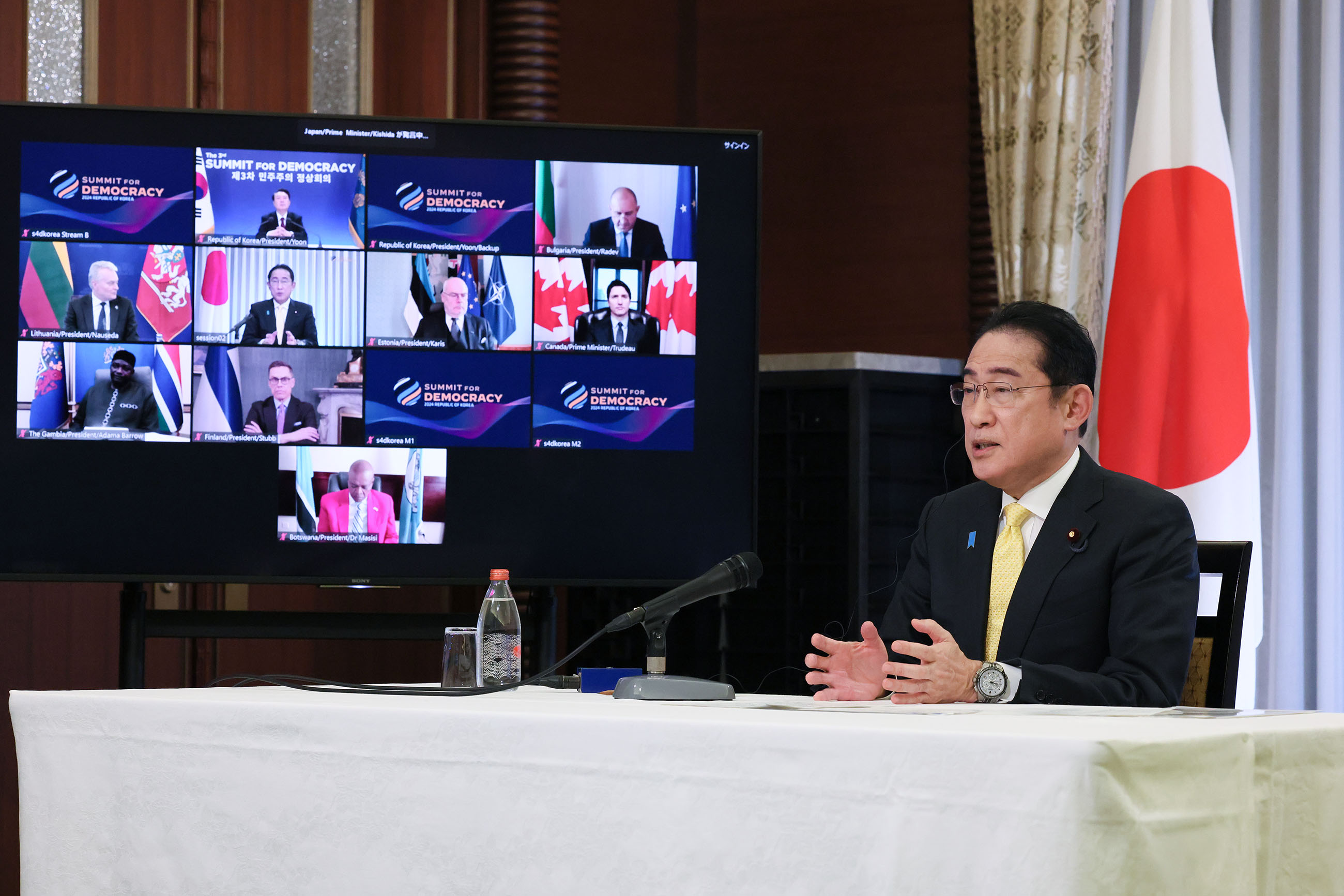Third Summit for Democracy (Summary)
March 20, 2024
[Provisional translation]
From March 18 to 20 (Japan time), the third Summit for Democracy was hosted by the Republic of Korea, and Mr. KISHIDA Fumio, Prime Minister of Japan, participated in the Leaders’ Plenary held in online format on March 20. The summary is as follows.
- The third Summit for Democracy took place over three days from March 18 to 20. It was composed of the Ministerial Conference, Multi-Stakeholder Roundtable, Civil Society and Youth Event and Leaders' Plenary, where a wide and diverse range of leaders from countries, regions and civil society gathered and discussed how strengthen democracy.
- On March 20, commencing at 9:30 p.m. for approximately an hour, Prime Minister Kishida attended the session on “Technology, Elections and Mis-/Dis-information” chaired by H.E. Mr. YOON Suk Yeol, President of the Republic of Korea. The overview of the statement by Prime Minister Kishida is as follows. (Nine leaders attended the session, including President Yoon and the Right Honourable Justin Trudeau, Prime Minister of Canada.)
(1) Democratic institutions and forms of democracy vary from country to country and time to time, and we are still searching for how democracy should be. Democracy should be diverse. However, we must not lose sight of its essence.
(2) It should be equipped with legal mechanisms that respect the will of the majority and at the same time defend the fundamental rights and freedoms of individuals and minorities. Equality before the law to guarantee those rights and freedoms, and free and fair elections, are also crucial aspects. Japan reiterates the importance of democratic principles and the underlying spirit of tolerance, cooperation, and compromise.
(3) We also need to address challenges to these principles in the online information space that new technologies opened up to us. The development of the Internet and social media platforms has given human beings access to a wide variety of information and avenues for expression. On the other hand, such developments have also made it easy to express and disseminate slanders and insults to others, and so-called "hate speech". This could result in exchanges of accusations and silencing of people’s voice, creating divisions in society and preventing healthy debate and discussion, which is essential for democracy. We need a stronger response.
(4) As free and fair elections are the foundation of democracy, it is essential that voters are able to make decisions of their own free will based on necessary and sufficient information in an environment where the freedom of expression is guaranteed. However, there is a risk of AI-generated deep fakes and spoofed audio making it difficult to distinguish between true and false information, and hindering people's political self-determination, and thereby destabilizing and disrupting society. To address these risks, Japan is also advancing discussion on technologies against dis- and misinformation by AI at the AI Strategy Council.
(5) The spread of disinformation is a challenge common to all countries and requires common understanding and collaboration at the international level. Japan launched the Hiroshima AI Process last year as the G7 Presidency and led the discussion on generative AI. The process successfully formulated the international guiding principles and code of conduct. Going forward, this initiative could be expanded beyond the G7.
(6) Last October, in order to share knowledge on measures against disinformation in the region, Japan also held the Internet Governance Forum for the first time as a host country. During the Forum, measures against dis- and misinformation were discussed, and a document called the Existing Practices against Disinformation was published, which compiles good practices of countermeasures against disinformation taken in many countries.
(7) We will continue to work with the international community to defend universal values, including democracy, while enjoying the benefits of technology. - In this summit, all invited countries and regions were encouraged to deliver a video message, and Japan delivered a video message in addition to Prime Minister Kishida's online participation in the Leaders' Plenary.
